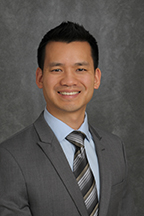 January 29, 2015 – Neuroscientist David Hsu, PhD has joined the faculty of the Department of Psychiatry as a tenure-track Assistant Professor to study the biological mechanisms that underlie social distress and reward. “I am especially curious about why different people respond so differently to social stressors like social rejection,” Dr. Hsu said, “why some people withdraw and become depressed while others become aggressive, or turn to drugs and alcohol.” He intends to look for answers in the rapidly expanding field of social neuroscience using the resources of the positron emission tomography (PET) and functional magnetic resonance imaging (fMRI) programs at Stony Brook.
January 29, 2015 – Neuroscientist David Hsu, PhD has joined the faculty of the Department of Psychiatry as a tenure-track Assistant Professor to study the biological mechanisms that underlie social distress and reward. “I am especially curious about why different people respond so differently to social stressors like social rejection,” Dr. Hsu said, “why some people withdraw and become depressed while others become aggressive, or turn to drugs and alcohol.” He intends to look for answers in the rapidly expanding field of social neuroscience using the resources of the positron emission tomography (PET) and functional magnetic resonance imaging (fMRI) programs at Stony Brook.
Dr. Hsu arrived with a bachelor’s degree in Biology and Psychology from Rutgers University and a PhD in Biological Psychology from the University of Wisconsin in Madison. He completed a post-doctoral fellowship to study stress circuits in the brain at Washington University in Saint Louis, and performed several PET and fMRI studies of stress and mood disorders as faculty at the University of Michigan in Ann Arbor.
In August 2013, Dr. Hsu and his colleagues at Michigan published an article in Molecular Psychiatry that caught the interest of both the popular and scientific press. They demonstrated that the brain responds to social rejection in the same way that it responds to physical pain – by releasing its own opioids to dampen feelings of being “hurt.” A follow up study was published this month titled “It still hurts: altered endogenous opioid activity in the brain during social rejection and acceptance in major depressive disorder,” in which they reported that the brains of people who were clinically depressed did not release as much opioids, and so they continued to feel hurt after rejection.
Dr. Hsu was hired as part of an interdisciplinary cluster hiring initiative of the Center for Affective Neuroscience of Depression and Anxiety (CANDA), which is designed to bring scholars from Psychiatry, Psychology, and Neurobiology together to study depression and anxiety in humans and animal models. Although Dr. Hsu and his colleagues will begin with studies of how the healthy brain processes emotions in the social environment, their ultimate goal is to improve the treatment of psychiatric illnesses. “The social environment powerfully influences who develops, and who gets better from psychiatric illnesses such as depression and anxiety,” Dr. Hsu said. “I look forward to collaborating with basic and clinical scientists in efforts to find novel approaches to more effective treatments.”

